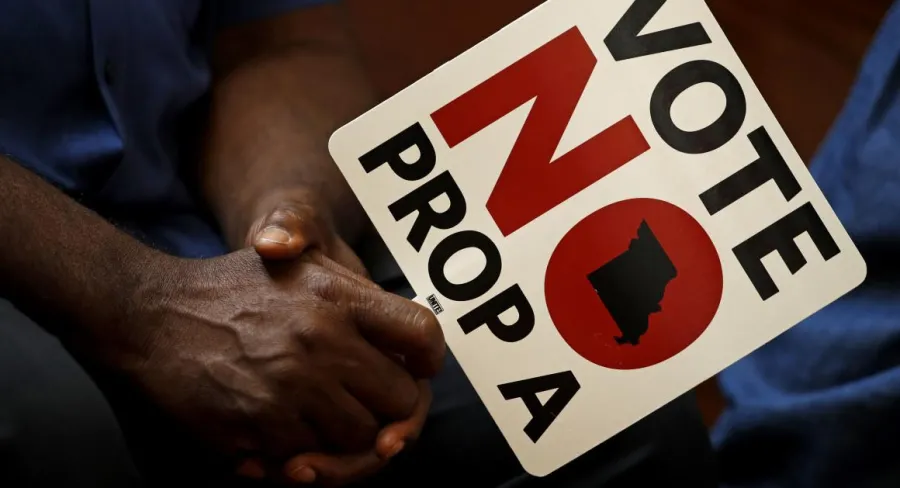Missouri Battles Right to Work Laws

From Politico.com
Unions, citing ‘buyer’s remorse,’ score major win in MissouriBy IAN KULLGREN
08/08/2018 05:06 PM EDTUpdated 08/08/2018 07:01 PM EDT
Democrats may have scored their most definitive win of Donald Trump’s presidency on Tuesday, as unions routed Republicans in a Missouri ballot measure battle that showed shocking strength from organized labor.
Unions crushed the state’s so-called right-to-work law, overwhelming conservative opponents by a 2-to-1 margin after running a deep-pocketed campaign. The outcome signals that unions still have paths to victory in red-leaning states — and provides a new playbook for fighting the policies of Republican-controlled state governments.
“I wouldn't want to be on the ballot if I was in favor of right to work in 90 days,” said former Democratic Gov. Jay Nixon. “Clearly, there's been a path defined.”
With their victory, unions may have discovered a strategy that fits neatly into their long history of organizing voters, countering conservative wins achieved mostly through legislatures and legal challenges. Their success comes after of a string of losses, most notably a Supreme Court ruling in June that all public-sector unions must follow right-to-work policies, cutting off a major source of funding.
Still, it remains to be seen whether the Missouri vote was a one-off or a sign of a broader union resurgence that could boost Democrats — including Sen. Claire McCaskill (D-Mo.) — in November's midterm elections.
Privately, even leaders of the union campaign were surprised at their success in Missouri, which Trump carried in 2016 with 57 percent of the vote. Right-to-work laws prevent unions from collecting mandatory "fair-share" fees, which cover the costs of collective bargaining but don’t fund political activity. Twenty-six states have them on the books, and Missouri became the 27th last year when a bill was signed by then-Gov. Eric Greitens.
Shortly after the measure became law in 2017, unions started building a campaign against it.
“There was much debate about whether we should engage here,” said Julie Greene, the AFL-CIO‘s director of mobilization. “The decision was made that this was the time to send a message and fight back.”
“This administration,” Greene added, “has woken the sleeping bear when it comes to labor.”
The unions’ Missouri campaign dominated the opposition, even as Republicans appear to have narrowly prevailed in a special election in Ohio. They won 68 percent of the vote against right to work, compared to 33 percent in favor.
The victory came after unions poured $15 million into the race, outraising their opponents 5-to-1. They dominated the airwaves and took their campaign into unionized workplaces, where representatives drummed up support. All told, the campaign knocked on 800,000 doors, a spokesman said.
Right-to-work supporters lost a key ally when Greitens, a rising GOP star, resigned amid scandals tied to an extramarital affair and possible violations of campaign finance laws. By the time Greitens stepped down in May, the union campaign was well underway.
"We hit a perfect storm in Missouri with what was going on in our executive branch, and the head start the unions got and the outside money flowing into the campaign,” said Dan Mehan, president of the Missouri Chamber of Commerce and Industry. The result, he said, “doesn't change the fact that right-to-work states are growing faster than non right-to-work states.“
Jack Cardetti, a Democratic strategist and spokesman for the anti-right-to-work campaign, said as many as half of Republicans who voted — about 300,000 — sided with unions. The results, he said, show that voters were “focusing on pocketbook issues“ over partisanship.
“This one really was, and that's an important distinction,“ Cardetti said.
The victory came the same night that two high-profile candidates backed by democratic socialist Sen. Bernie Sanders (I-Vt.) lost their races. In Michigan, former state Sen. Gretchen Whitmer soared past Abdul El-Sayed by more than 20 percentage points in the Democratic primary for governor. In Kansas, former Sanders campaign staffer Brent Welder was edged by attorney Sharice Davids.
It was a sharp turnaround for labor, which experienced an embarrassing defeat in 2016 when an unusually high share of union households broke with Democrats to vote for Trump. The results from Tuesday's Missouri vote may be an early indicator they’re drifting to the left again.
"There's a lot of buyer's remorse that we're finding for the small percentage of our members that did vote for Trump,” Greene said. “The margin of that win has to send a message nationally to states and state legislatures who are thinking about enacting this. We're not going to take this hands down. We're going to fight.”
